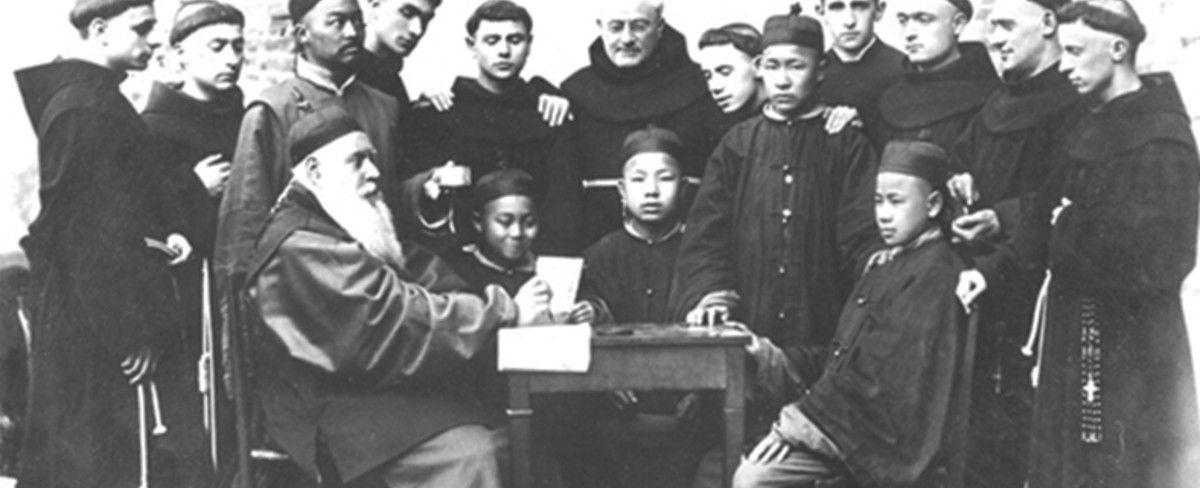25 Franciscan Martyrs in China: Caught in the Crossfire of Political Currents

On July 8, the Franciscan family honors the memory of a group of 25 Franciscans, both European missionary friars and sisters and native Secular Franciscans, who were martyred in Shanxi province, China, this day in 1900 during the Boxer Rebellion.
Martyred during the 1900 Boxer Rebellion in China
As has often been the case, Western missionaries who had come to a foreign country to bring the Gospel to native peoples became caught in the crossfire of wider political currents. In 1898 several European governments exacted significant financial and territorial concessions from the Chinese Empire, capping a process that had been going on since the 1840s. The imperial government also promulgated some liberal "reforms" bringing significant Western perspectives into the Chinese educational system.

Bishop Francesco Fogolla, OFM (seated with white beard), coadjutor to Bishop Gregory Grassi, with a group of friar missionaries and Chinese seminarians. Bishop Fogolla and some of the others pictured here were victims of the massacre on July 9, 1900.
Goal to eliminate all foreign influence in China
In reaction, a strong militant populist movement, the "Righteous and Harmonious Fists" (Yihequan), known to Westerners as "Boxers,” began forming with the goal of eliminating all foreign influence in the country. The conservative Empress Dowager Cixi seized control of the government with the support of the "Boxers" and in June 1900 declared war on the Western powers and Japan.
Franciscans expand their presence
Italian Franciscan friar missionaries had begun working in Shanxi province in the 18th century, but with greater toleration of Christianity since the 1840s, they had expanded their presence greatly. The friars had maintained a mission around the city of Taiyuan for over 30 years. The Bishop of Northern Shanxi, Gregory Grassi, OFM, was based in the city, where the friars conducted a seminary to train a native Chinese clergy. There was also an orphanage, staffed by seven young Franciscan Missionaries of Mary, who had arrived only the year before, headed by Sr. Marie-Hermine de Jésus.

The Taiyuan cathedral of the Immaculate Conception, built in 1870 and badly damaged during the Boxer rebellion, was afterward restored. The friars' decision to build this prominent structure was seen by some Chinese as an affront to local culture. It is still functioning today.
Pressure rises against Christians
When war was declared in June 1900, pressure rose against Christians. On July 1, the governor of Shanxi, Yuxian, issued a harsh edict calling on Chinese Christians to apostatize. On the afternoon of July 5, Boxer mobs raided the Taiyuan mission and apprehended 5 friars, the 7 sisters, as well as 11 Chinese Secular Franciscans, of whom 6 were seminarians, the others lay employees at the mission, as well as 3 other lay employees. They all were brutally executed several days later.

This montage, assembled in 1901 from earlier photos, shows some of the Franciscan martyrs of Shanxi.
Christianity cannot be crushed
A number of Protestant missionaries and their families, including children, were also massacred at the same time. Also, three other Italian friar missionaries were killed in Hunan province several days earlier. Over the course of the summer, well over 2,000 Chinese Christians were killed in the province of Shanxi. But Christianity could not be crushed—and 25 years later several hundred Franciscan missionaries were working actively in China with great effect.
Church canonizes large group of Chinese martyrs
This group of Franciscans was beatified in 1946 and canonized as saints in 2000 with a large group of other Chinese martyrs. There is a good link on the Franciscan Missionaries of Mary at:
https://fmm.org/saints-and-blessed/

The seven Franciscan Missionaries of Mary, headed by Sr. Marie Hermine de Jesus, who had just arrived in China in 1899. They ranged in age between 25 and 36.
Dominic Monti, OFM
Professor of Franciscan Research in the Franciscan Institute of St. Bonaventure University
Dominic V. Monti, OFM, is a Franciscan Friar of Holy Name Province (USA) and currently professor of Franciscan Research in the Franciscan Institute of St. Bonaventure University. He devoted the greater part of his ministry to teaching the History of Christianity, in particular the history of the Franciscan movement. He has contributed two volumes to the Works of St. Bonaventure series and is author of Francis & His Brothers, a popular history of the Friars Minor.

